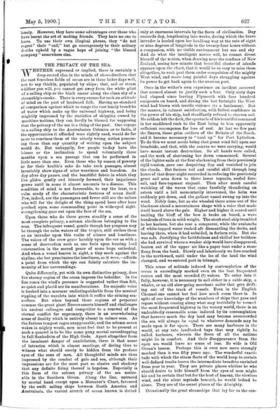THE PRIVACY OF THE SEA.
WHETHER expressed or implied, there is certainly a deep-rooted idea in the minds of shore-dwellers that the vast fenceless fields of ocean are in these latter days well, not to say thickly, populated by ships ; that, sail or steam whither you will, you cannot get away from the white glint of a sailing ship or the black smear along the clean sky of a steamship's smoke. There is every excuse for such an attitude of mind on the part of landward folk. Having no standard of comparison against which to range the vast lonely breadths of water which make up the universal highway, and being mightily impressed by the statistics of shipping owned by maritime nations, they can hardly be blamed for supposing that the privacy of the sea is a thing of the past. One voyage in a sailing ship to the Australasian Colonies or to India, if the opportunities it afforded were rightly used, would do far more to convince them of the utterly wrong notion possess- ing them than any quantity of writing upon the subject would do. But unhappily, few people to-day have the leisure or the inclination to spend voluntarily three months upon a sea passage that can be performed in little more than one. Even those who by reason of poverty or for their health's sake do take such passages, almost invariably show signs of utter weariness and boredom. As day after day passes, and the beautiful fabric in which they live glides gently and leisurely forward, their impatience grows until in some it almost amounts to a disease. This condition of mind is not favourable, to say the least, to a calm study of the characteristic features of ocean itself. Few, indeed, are the passengers and fewer still are the sailors who will for the delight of the thing spend hour after hour perched upon some commanding point in wide-eyed sight- strengthening gaze out upon the face of the sea.
Upon those who do there grows steadily a sense of the most complete privacy, a solemn aloofness belonging to the seas. The infrequent vessel, gentle though her progress may be through the calm waters of the tropics, still strikes them as an intruder upon this realm of silence and loneliness. The voices of the crew grate harshly upon the ear as with a sense of desecration such as one feels upon bearing loud conversation in the sacred peace of some huge cathedral. And when a vessel heaves in sight, a tiny mark against the skyline, she but punctuates the loneliness, as it were,—affords a point from which the eye can faintly calculate the im- mensity of her surroundings.
Quite differently, yet with its own distinctive privacy, does the stormy region of the ocean impress the beholder. In the fine zones the wind's presence is suggested rather than felt, so quiet and placid are its manifestations. Its majestic voice is hushed into a murmur undistinguishable from the musical rippling of the wavelets into which it ruffles the shining sea- surface. But when beyond those regions of perpetual summer the great giant Boreas asserts himself and challenges his ancient colleague and competitor to a renewal of the eternal conflict for supremacy, there is an overwhelming sense of duality which is entirely absent in calmer seas. As the furious tempest rages unappeasable, and the solemn ocean wakes in mighty wrath, men must feel that to be present at such a quarrel is to be like some puny mortal eavesdropping in full Sanhedrim of the High Gods. Apart altogether from the imminent danger of annihilation, there is that sense of intrusion which is almost sacrilege, of daring thus to witness what should surely be hidden from the profane eyes of the sons of men. All thoughtful minds are thus impressed by the combat of gale and sea, although their impressions are for the most part so elusive and shadowy that any definite fixing thereof is hopeless. Especially is this form of the solemn privacy of the sea notice- able in the Southern Ocean. Along the line, untraced by mortal hand except upon a Mercator's Chart, favoured by the swift sailing ships between South America and Australasia, the vastest stretch of ocean known is dotted only at enormous intervals by the fleets of civilisation. Day succeeds day, lengthening into weeks, during which the brave intruder is hurled upon her headlong way at the rate of eight or nine degrees of longitude in the twenty-four hours without a companion, with no visible environment but sea and sky And do what the intelligent novice will, he cannot divest himself of the notion, when drawing near the confines of New Zealand, seeing how minute that beautiful cluster of islands appears upon the chart, that it would be so easy to miss them altogether, to rush past them under compulsion of the mighty West wind, and waste long painful days struggling against its power to get back again to the overrun port.
Once in the writer's own experience an incident occurred that seemed almost to justify such a fear. Only sixty days had elapsed since leaving Plymouth with four hundred emigrants on board, and during the last fortnight the West wind had blown with terrific violence (to a landsman). But the master, in calmest satisfaction, with fullest confidence in the power of his ship, had steadfastly refused to shorten sail. He seldom left the deck, the spectacle of his beautiful command in her maddened rush to the East being to him apparently sufficient recompense for loss of rest. At last we flew past the Snares, those grim outliers of the Britain of the South, and it became necessary to "haul up" for Port Lyttelton. To do this we must needs bring that great wind full upon our broadside, and that, with the canvas we were carrying, would have meant instant destruction. So all hands were called, and the work of shortening her down commenced. Several of the lighter sails at the first slackening from their previously rigid tension, gave one despairing flap and vanished to join the clouds. But furious toil and careful skill through long hours of that dense night succeeded in reducing the previously great sail area down to three lower topsails, reefed fore- sail, and fore-topmast staysail. Then after much careful watching of the waves that came fatefully thundering on astern until a lull momentarily intervened, the helm was suddenly put down, and the gallant vessel swung up into the wind. Nobly done, but as she wheeled there arose out of the blackness ahead a mountainous shape with a voice that made itself heard above the gale. Higher and higher it soared until smiting the bluff of the bow it broke on board, a wave hundreds of tons in solid weight. The stout steel ship trembled to her keelson, but she rose a conqueror, while the avalanche of white-topped water rushed aft dismantling the decks, and leaving them, when it had subsided, in forlorn ruin. But she was safe. Justifying the faithfulness and skill of her builders. she had survived where a weaker ship would have disappeared, beaten out of the upper air like a paper boat under a stone flung from the bank. Slowly and laboriously we fore-reached to the northward, until under the lee of the land the wind changed, and we entered port in triumph.
This sense of solitude induced by contemplation of the ocean is exceedingly marked even on the best frequented routes and the most crowded (?) waters. To enter into it fully, however, it is necessary to sail either in a cable ship, a whaler, or an old slow-going merchant sailor that gets drift- ing out of the track of vessels. Even in the English Channel one cannot but feel how much room there is. In spite of our knowledge of the numbers of ships that pass and repass without ceasing along what may truthfully be termed the most frequented highway in the watery world, there is an undoubtedly reasonable sense induced by its contemplation that however much the dry land may become overcrowded the sea will always be equal to whatever demands may be made upon it for space. There are many harbours in the world, at any rate landlocked bays that may rightly be called harbour; wherein the fleets of all the nations might lie in comfort. And their disappearance from the open sea would leave no sense of loss. So wide is Old Ocean's bosom. Perhaps this is even now more strongly marked than it, was fifty years ago. The wonderful exacti- tude with which the steam fleets of the world keep to certain well-defined tracks leaves the intermediate breadths unvisited from year to year. They are private places whither he who should desire to hide himself from the eyes of men might hie and be certain that but for the host of heaven, the viewless wind, and the silent myriads beneath, he would indeed be alone. They are of the secret places of the Almighty.
Occasionally the great steamships that lay for us the con- necting nerves of civilisation penetrate these arcana, for their path must be made on the shortest line between two continents heedless of surface tracks. And the wise men who handle these wonderful handmaids of science know how private are the realms through which they steadily steam, leaving behind them the thin black line along which shall presently flash at lightning speed the thought-essence of mankind. The whaler, alas! is gone ; the old leisurely South Seaman to whom time was a thing of no moment. Her ruler knew that his best prospect of finding the prey he sought was where no keel disturbed the sensitive natural vibra- tions of the wave. So these vessels saw more of sea solitude than any others. Saw those weird spaces un- visited even by wind, great areas of silky surface into whose peaceful glades hardly rolled a gently undulating swell bearing silent evidence of storms raging half a world away. So too upon occasion did, and does, a belated sailing ship, such as one we met in the Southern seas bound from the United Kingdom to Auckland that bad been then nine months on her passage. Into what dread sea-solitudes she had intruded. How many, many days had elapsed during which she was the solitary point rising from the shining plain into the upper air. Her crew had a wistful look upon their faces, as of men whose contact with the world they dimly remembered had been effectually cut off. And truly to many, news of her safety came in the nature of a message of resurrection. Books of account concerning her had to be re- opened, mourning garments laid aside. She had returned from the silences, had rejoined the world of men.
All the tracks along which ships travel are but threads traversing these private waters, just little spaces like a trail across an illimitable desert. And even there the simile fails, because the track across the ocean plain is imaginary. It is traced by the passing keel and immediately it is gone. And the tiny portion of the sea-surface thus furrowed is but the minutest fraction of the immeasurable spaces wherein is enthroned the privacy of the sea. F. T. BULLER.







































 Previous page
Previous page